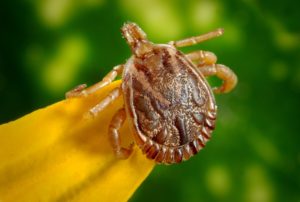For people who find a tick embedded in their skin
By Greg Lee

“Uh oh,” I thought as I discovered a small embedded tick on my daughter’s head. My second thought was, “Did it just give her Lyme disease?” Here is what you can do when you find an attached tick.
How long does it take for a tick to transmit Lyme disease to a person?
Deer tick nymphs can be as small as a poppy seed or a little larger than the size of this period “.”. The adults can be about the size of a sunflower seed or about the size of the letter “o”. The tick on my daughter was an adult deer tick.
Some experts say that it needs to be attached 24 hours or longer to transmit the bacteria. Others say that you can get infected as soon as the tick bites you. The truth is that no one knows for sure how long a tick has to be attached to infect you. Also, only 50% of people who get infected ever develop a bulls eye rash. My daughter had a raised bump where the tick was attached and did not develop a rash. The first thing we did was to get the tick out.
Recommendations for removing embedded ticks
Using a pair of pointed tweezers, gently grasp the tick where it is connected to the skin. Gently and slowly pull the tick out of the skin using firm and steady pressure.
DOs and DONTs for removing ticks
AVOID squeezing the tick too hard.
DO NOT place vaseline on the tick.
DO NOT place a burned match head on the tick.
DO NOT put alcohol on the tick.
By using only gentle force to pull out the tick, you minimize the chance of any of the tick’s contents from being squirted into you. Place the tick in two small ziploc bags if it is still alive. You can also use a small tightly sealed container. This will prevent the tick from escaping while you are mailing it for testing.
DO NOT place anything on the tick:
- NO antiseptics
- NO pesticides
- NO preservatives like alcohol on the tick.
DO NOT place the tick on tape to immobilize it.
These can interfere with the process of testing the tick for Lyme disease. Use an anti-bacterial cleanser on the area where you removed the tick and on your hands. Here’s where you can send a tick to get it tested.
Labs can test your tick for Lyme disease and other infections
There are several labs that will test your tick for the presence of genetic material of the Lyme bacteria. You do not need your doctor’s permission to test the tick. Unfortunately, tick can carry up to 60 other diseases. We decided to get the tick tested for these infections: Lyme disease, Babesia, and Bartonella.
I took the tick to be tested at Clongen Labs in Germantown, MD. The head of the lab, Dr. Kilani, said that 30% of the ticks tests are positive for Lyme and other co-infections in the springtime. This number increases later in the summer where up to 60% – 70% of the ticks test positive. The test results are sent via email in 1-5 business days. Here is where you can download the instructions and a form for submitting your tick:
We waited anxiously over the next few days for the test results to come back over email. Meanwhile, we took preventative measures to stop a possible infection.
Preventative Treatments for Lyme Disease
We contacted our pediatrician and told her that we found an attached tick. We also told her that we would forward the results of the Clongen tick test to her office. We asked her about giving my daughter a Lyme test. The Western Blot is the most accurate one available. However with an early infection, your immune system may not have produced enough antibodies to give you a positive Lyme test. We decided to wait for the Clongen tick test results before proceeding with a Western Blot blood test for Lyme.
Alternative Treatments for Lyme Disease
If you want to strengthen your immune system against infection, there are several anti-bacterial herbs that are available.
Raw garlic is a Chinese folk remedy to protect against infection and parasites. You can take 3-5 toes of raw garlic with food to boost your immune system. Adults have an easier time with this remedy. There was no way to get my daughter to take raw garlic. Fortunately, we had other anti-Lyme remedies.
Luckily, we had several of these herbs already in capsules:
– Japanese Honeysuckle Vine, Chinese name Ren Dong Teng
– Artemisia, Chinese name Qing Hao
– Smilax, Chinese name Tu Fu Ling
– Andrographis, Chinese name Chuan Xin Lian
– Teasel Root, Chinese name Xu Duan
– Houttuynia, Chinese name Yu Xing Cao
– Polygonum Cuspidati, Chinese name Hu Zhang
Much to our relief, the tick tested negative for Lyme disease, Babesia, and Bartonella. Much to my daughter’s relief, she didn’t need to take any more herb capsules. By knowing the proper procedures for removing ticks, testing them, and preventative treatments helped to reduce our worries about a Lyme disease infection.
Next Step: Want to learn more about healing Lyme disease? Click here to learn more about treatment at the Lyme Research & Healing Center in Frederick, Maryland.